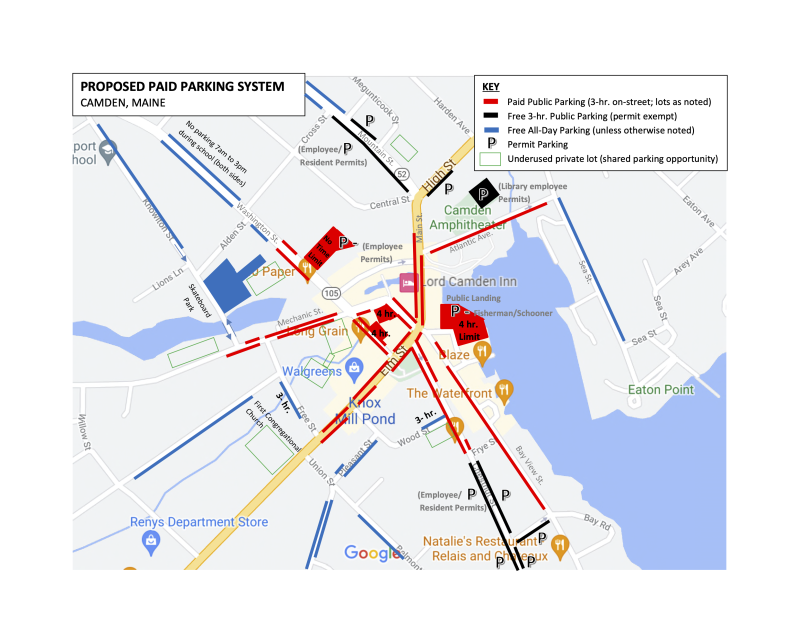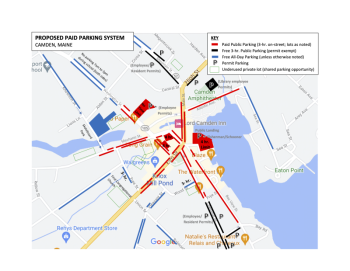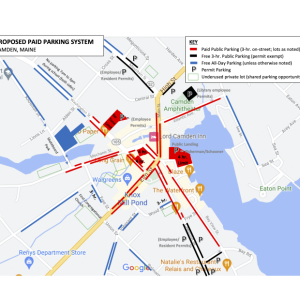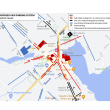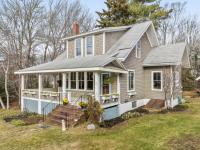UPDATE: Camden Select Board approves implementing downtown seasonal paid parking system
CAMDEN — At a vote of three to two, the Select Board in Camden approved a paid seasonal parking program. The decision was made Oct. 15 following a lengthy board discussion that included public comment.
Board member Alison McKellar made a motion to move forward with implementing the paid parking system throughout the downtown, with the recommendations from the parking working group to be brought forward to the Select Board at a later time.
Board Chair Susan Dorr made a second to that motion.
The motion includes making purchases necessary to implement the system, McKellar noted.
Board members Dorr, McKellar and Ton Hedstrom voted in favor of the motion while board members Chris Nolan and Ken Gross opposed the measure, calling it cumbersome and annoying, and lacked endorsement by downtown business owners.
A proposal to charge for parking in downtown Camden on a seasonal schedule will appear before the Camden Select Board Oct. 15 at a regularly scheduled meeting.
The Select Board is convening at 5 p.m. in executive session to consult with legal counsel and the code enforcement officer. At 6 p.m., the board will begin its publicly held meeting in the French Meeting Room at the Camden Town Office. It will be streamed live here.
The meeting's agenda also includes the topic of winter dockage for the schooner Mercantile. A request has been made to winter-over the vessel in Camden Harbor at the berth it formerly held.
The Select Board discussed the Mercantile’s situation at its Oct. 1 meeting. Minutes reflected that the schooner was sold to: “Bob Schaefer, who initially planned to move the boat to the Great Lakes. However, the boat returned to Camden after logistical issues halted the move.”
Minutes also said the town needed insurance verification, and concerns were raised about the schooner’s condition and the fact that the boat’s bilge needs daily pumping.
There will also be a public hearing concerning new guidelines for a general assistance ordinance, and the introduction of four new Camden firefighters.
Parking
A memo to the Camden Select Board from Town Manager Audra Caler outlines the parking program proposal. Caler referenced Camden’s 2022 Parking Study, which was updated by a 2024 utilization survey, followed by a Revenue-Cost Projections, Recommended Paid Parking Program issued July 5 by consultant John M. Burke, who is based in Amherst, Mass.
Parking, or adequate lack of, has been under discussion in Camden for decades. For parking discussion purposes, the downtown includes a radius around the harbor, and includes the smaller streets of Alde, Cross, Pearl, Union, Wood, Chestnut, Pleasant, Tannery Lane, Atlantic Ave., Free and Frye.
"Back in 1995, a Town Ad Hoc Parking Committee issued a study report stating that the Town was running a deficit of needed parking and should implement a seasonal 'Pay-to-Park' trial, expand employee parking areas, and strictly enforce the 2-hour time zone," according to the 2022 Parking Study.
In the late 1990s, when the town was bustling with the establishment of MBNA offices in the Knox Mill, there were ideas of building two-level parking decks to accomodate more traffic in Camden. That never came to fruition, nor the recommendations in a 2012 Downtown Master Plan calling for a paid parking system.
The 2022 Parking Study summarizes the history of the parking debate in Camden, and added its own assessment and recommendations.
That Study was initiated by a committee comprising citizens and town staff, and they concluded that there was sufficient supply of parking downtown to meet current demand, although there was an imbalance of over-use of public parking (Public Safety Building Parking lot, Knowlton Street lot, Camden Public Library lot, Mechanic and Washington Street lots, and Public Landing lot, although the latter has since been converted to a seasonal paid parking lot) versus private parking lots, as well as an over-sue of on-street parking vsersus off-street parking.
The 2022 Study also noted insufficient two-hour parking availability from late morning through early afternoon, when parking occupancy exceeded 92 percent. Moreover, the Study said, "The Town has been unsuccessful in keeping employees out of the free on- and off-street, two-hour customer spaces."
The 2022 Study recommended season paid parking with meters in two-hour parking zones and high-demand parking lots, from May 1 through Oct. 31.
The 2022 Study was updated with 2024 utilization survey, followed by a revenue-cost projections report. Those reports are included in the Oct. 15 Select Board Select Board meeting packet, along with an Oct. 7 memo from Town Manager Audra Caler.
In her pre-meeting memo, Caler said: "Collectively, these reports provide a strong rationale for implementing a seasonal paid parking program for downtown Camden, particularly to address parking demand during peak tourist months, improve parking management, and generate revenue to offset debt service for road infrastructure upgrades and reduce property tax burdens."
The reports she cites conclude that the on-street parking consistently exceeds 85 percent occupancy during peak hours, which contributes to congestion. Private parking lots remain under-utilized, occupied at 50 percent, while public lots are overused. And, there is low turnover in high demand areas, "primarily caused by employees 'shuffling' their cars in two-hour zones, reducing space for short-term visitors and making parking harder to find."
Caler said the paid parking program as presented could generate more than $638,000 annually, including $531,238 from metered parking, $5,875 from permit fees, and $101,699 from parking citations.
"This revenue can be used to support public services, fund infrastructure improvements, and help offset property taxes," she wrote.
The Revenue-Cost Report recommends enforcement coverage of one officer on duty during all hours when metered parking is in effect, as well as two part-time enforcement officers.
“The additional part-time staffing will also allow the current full-time Parking Enforcement Supervisor the additional time needed to manage the paid parking system,” said Burke, in his cost projections.
He recommends the following Paid Parking Program structure:
Seasonal metered parking in effect: 9 a.m. to 6 p.m., seven days a week including holidays, June 1 to October 15
Meter rate: $2 per hour
Employee permit fee: $30 per month or $100 per season
Resident permit fee: $30 per season
Expired meter and overtime parking citation fine is $30
Metered streets (three-hour time limit):
• Elm St. – Free St. to Mechanic St.
• Mechanic St. – Knowlton St. to Main St.
• Main St. – Mechanic St. to just north of Atlantic Ave.
• Atlantic Ave. – Main St. to Sea St.
• Chestnut St. – Elm St. to Frye St.
• Washington St. – Elm St. to Knox Mill Lot
• Bay View St. – Main St. to Wilson St.
Metered lots:
Public Landing Lot (four-hour time limit) – currently metered/no employee permits allowed
Mechanic St. Lot (four-hour time limit) – no employee permits allowed
Washington St. Lot (four-hour time limit) – no employee permits allowed
Public Safety Lot (no time limit) – employee permit holders are exempt from paying meter
Three-hour, non-metered streets (employee/resident permit holders are exempt from time limits)
• Mountain St. – Main St. to Cross St.
• High St. – south side just east of Main St.
• Chestnut St. – Frye St. to south of Wilson St.
• Wilson St. – Chestnut St. to Bay View St.
Revenue
The metered parking is anticipated to generate $531,238, 80 percent from kiosk payments and 20 percent from mobile phone apps. Burke is banking on a growing percentage of mobile app payments.
Seasonal permit parking revenue is anticipated to be $5,875.
“However, by incentivizing employee long-term parkers to use a deeply discounted permit in the Public Safety Lot or on underutilized, free, time-restricted streets instead of in parking at metered spaces in front of retail businesses, the parking permits can significantly increase metered parking availability and revenue,” Burke wrote in the revenue report.
And, the citations could total $101,699, he wrote.
“The projected revenue loss of the one-time courtesy waiver to Camden residents is $21,114,” Burke said.
While the total revenues are estimated to be $638,812, there will be a capital expenditure to get the system in place.
The purchase and installation of the 40 solar-powered parking payment kiosks will cost $410,000.
Fees to cover software, communication and credit card fees (5 percent of the credit card revenue) will be approximately $94,940.
Staffing at $20 per hour will be approximately $18,000.
The total initial cost of the first year is estimated to be $522,940, resulting in an operating income of $115,872.
Year Two would see total revenue of $638,812. With operating costs of $112,940, the town would realize $525,872 in operating income.

